Albert Schweitzer, the man from Strasbourg
For the general public, Albert Schweitzer’s name is associated with distant horizons: the banks of the River Ogooué and Gabon; the United States, where, in the 1940s and 1950s, he was described as “the greatest man in the world“; Norway, where, in 1954, he was awarded the Nobel Peace Prize, and from where he launched his appeals against nuclear weapons… However, between 1893 and 1912, it was Strasbourg that his name was inextricably linked with, and more particularly with its University, where Schweitzer studied and taught for more than ten years.
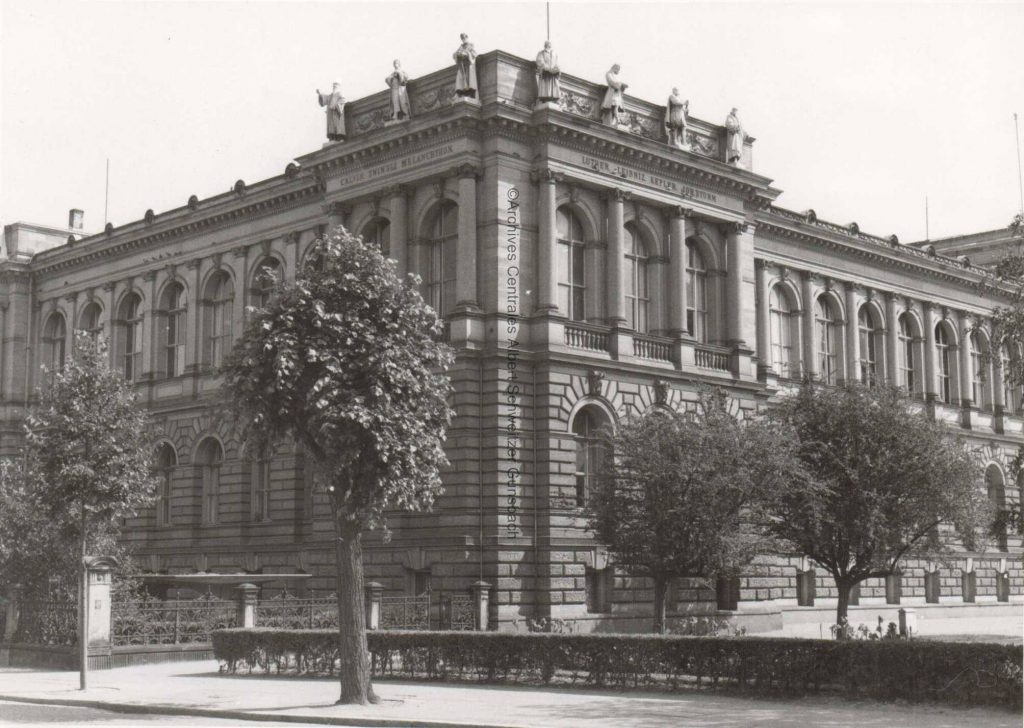
In the autumn of 1893, after passing his baccalauréat, Albert Schweitzer enrolled at the University of Strasbourg, which Emperor Wilhelm II had intended to be a showcase for German science and an instrument for the Germanisation of the Alsatian elite.
In fact, the Kaiser-Wilhelms-Universität, now housed in its new, modern and bright buildings in the Neustadt, was “booming”. Teachers and students were working together to realise the ideal of modern higher education. […] A new, young spirit animated the entire University“, wrote Albert Schweitzer in 1931 in Ma vie et ma pensée. This was particularly the case at the Faculty of Protestant Theology, where, as the son of a pastor, Schweitzer naturally attended classes. Prestigious masters such as Edouard Reuss, the editor of Calvin’s works and translator of the Bible, were no longer active, but remarkable men had taken over, foremost among them Heinrich Julius Holtzmann, the undisputed master of New Testament studies.
The historical-critical method
Like his colleagues in Strasbourg, Holtzmann practised the so-called “historical-critical” method. Holding the Bible to be a human document, marked by history, this method rejected the idea that Scripture had been inspired literally and that each of its words was sacred. Each biblical book is linked to a given historical and social environment, and has a long history; one of the interpreter’s tasks is to identify literary additions: for example, the “accounts of the childhood of Jesus” at the beginning of the Gospels of Matthew and Luke.
There was no doubt some tension between Holtzmann, who regarded Jesus as a moral teacher, and Schweitzer, who saw him as an impetuous prophet announcing the end of times. In his autobiography, Schweitzer says nothing about this, so much so was his gratitude to the “admired master” who aroused his passion for the New Testament, provided him with a doctoral scholarship and, in 1902, made him a Privatdozent at the Faculty of Protestant Theology. However, other sources show the extent to which the two men’s positions diverged.
The fact that Schweitzer studied and taught at the Protestant Faculty of Theology should not obscure the fact that he could have chosen a different path. From the outset, he opted for a double degree: theology and philosophy, not to mention a few lessons in musicology, as he was a brilliant organist. In addition to his robust health, which allowed him to sleep only a few hours a night, the study regime of the time made this performance easier.
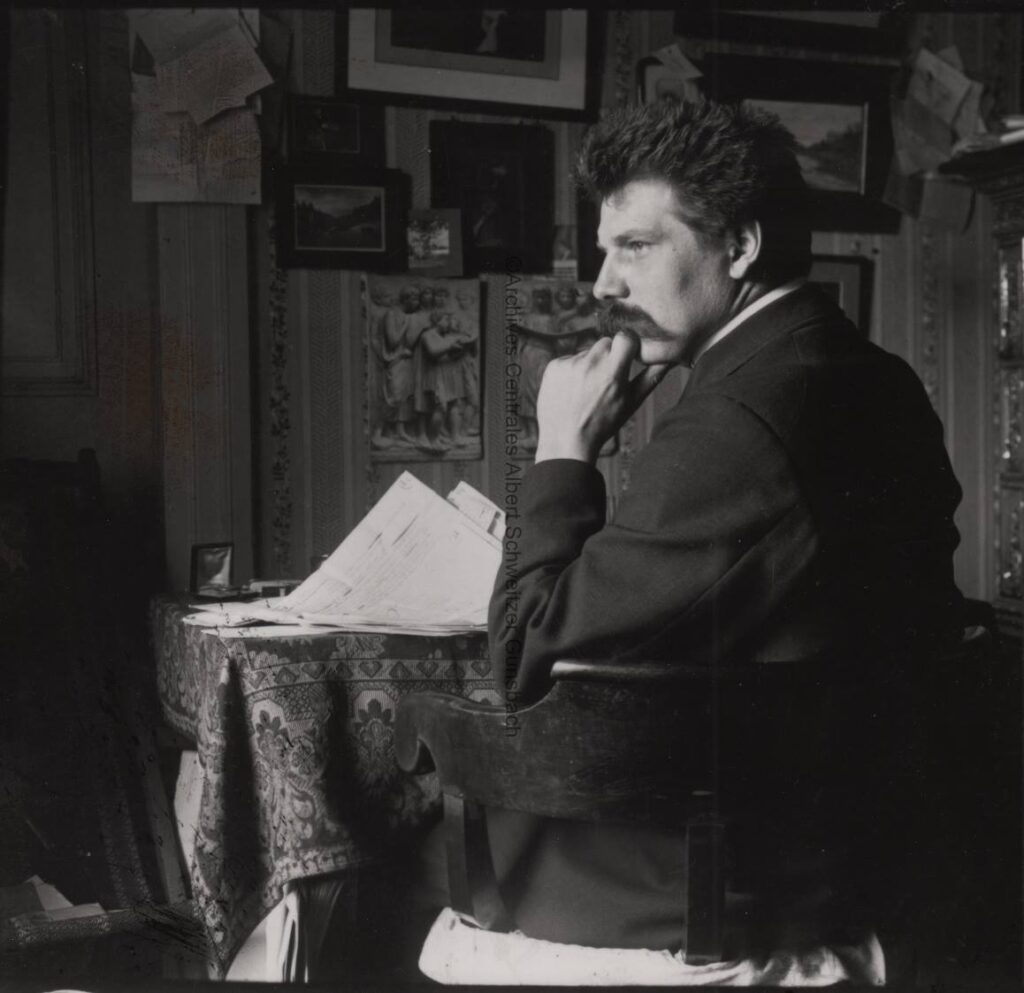
How grateful I was to the university I was attending because it didn’t supervise students or keep them constantly on their toes with exams […]. This gave me complete freedom to pursue my personal research.
Out of My Life and Thought
Thesis and curriculum
In July 1899, Albert Schweitzer completed his philosophy thesis on the place of religion in Kant. The laudatory opinions of his examiners, Theobald Ziegler and Wilhelm Windelband, would have opened up a university career for him in this discipline… if the Faculty of Philosophy had allowed one of its teachers to be a preacher at the same time. However, this was not the case, and Schweitzer, who had been vicar of the parish of Saint-Nicolas since 1898, felt an “innate need” to preach.
In the autumn of 1905, he began a third course of study: medicine, so that he could go to the French Congo to work for the Paris Mission. He was 30 years old at the time and, in addition to his work as a pastor and teacher, he was also an active concert performer and organ builder. When I presented myself as a student to Professor Fehling, then Dean of the Faculty of Medicine, he would gladly have referred me to one of his colleagues in psychiatry”, he wrote. However, it was his colleagues at the Faculty of Medicine who advised him to take a full course in medicine; in the autumn of 1905, he was still planning to go to Africa after acquiring “some knowledge” of medicine in two years.
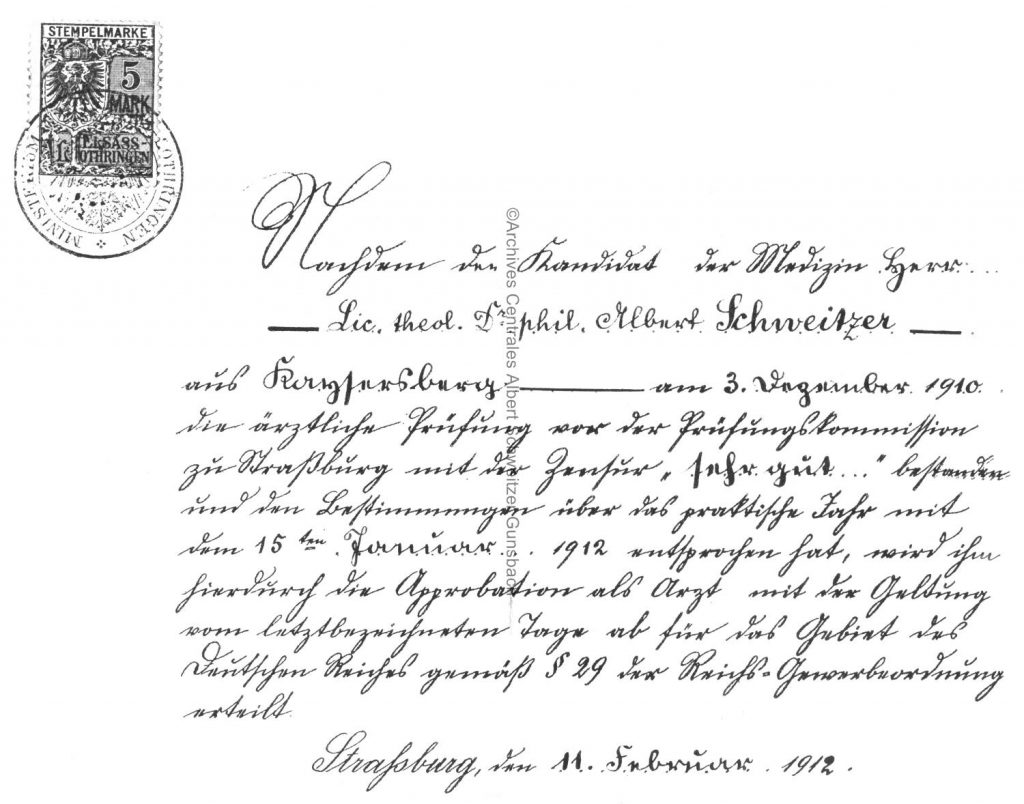
Three times doctor of the University of Strasbourg
Although the Faculty of Medicine examined him as rigorously as its young fellow students, it did grant him a few favours: he was able to attend lectures free of charge, and – if we are to believe certain accounts – instead of sitting on the benches in the lecture theatres, he was entitled to a small table with a chair. In February 1912, he not only obtained the authorisation to practise medicine, but also set about completing this brilliant course of study with a doctoral thesis, which he defended shortly before his departure for Lambaréné. It was on The psychiatric study of Jesus. By March 1913, Schweitzer was a three-time doctor of the University of Strasbourg.
His extensive medical studies were not at the expense of his extensive and original publications, his carefully prepared theology courses or his work as an organist.
Schweitzer was a passionate researcher, who used all his time off to complete works, and a teacher devoted to his students. However, his reputation as a theologian and his brilliant musical career did not fail to earn him enmity and jealousy within the University. When, in 1906, he left his post as headmaster of the “Stift”, where the Protestant theology students were housed, it was not only to devote himself to his medical studies, but also because of the hostility of the Protestant theology faculty: Wilhelm Nowack, the oldest of his colleagues, had made it clear that the Faculty took a dim view of the support classes he was giving in Greek and Hebrew to the students at the Stift.
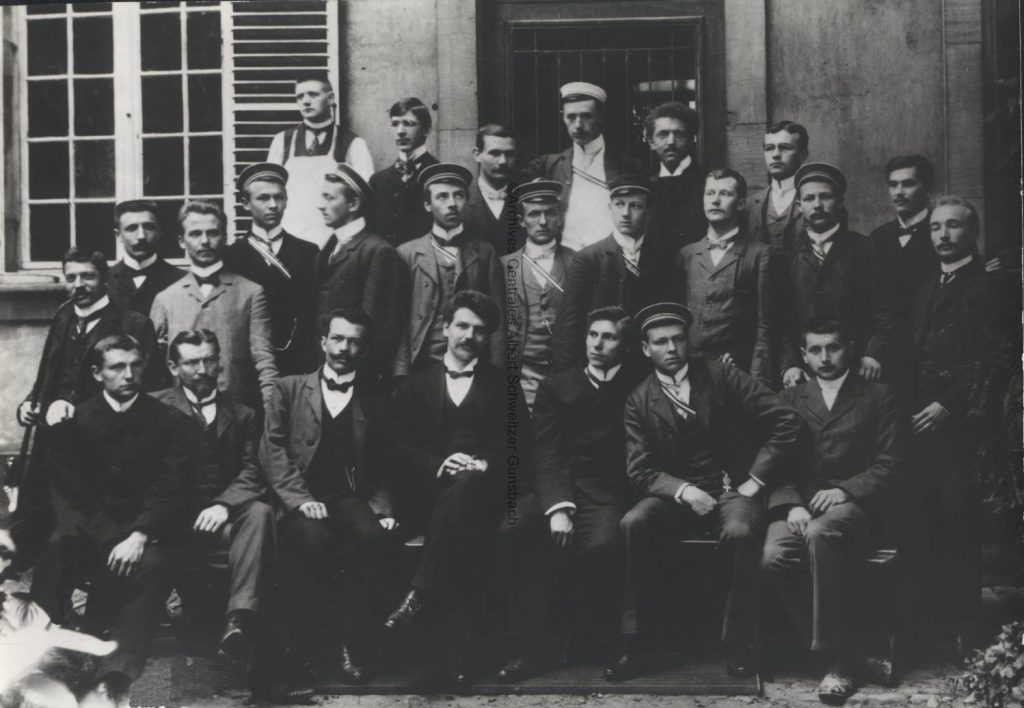
Privatdozent function
Nevertheless, Schweitzer taught at the University of Strasbourg until 1912. He remained Privatdozent, i.e. in charge of courses that students were not obliged to attend, despite having a more extensive bibliography than many full professors. In addition to his thesis on Kant, several books on Jesus and a work on the apostle Paul, he wrote an important J-S. Bach (French edition 1905, German edition greatly expanded 1908).
Unlike other Alsatians, he did not look across the Rhine for a professorship that he would have found easily (the University of Strasbourg favoured “native Germans”). It is true that his duties as Privatdozent were compatible with those of a pastor (the salary of a Privatdozent was quite symbolic), and they spared him the administrative tasks – admittedly less onerous than today – that fell to a professor.
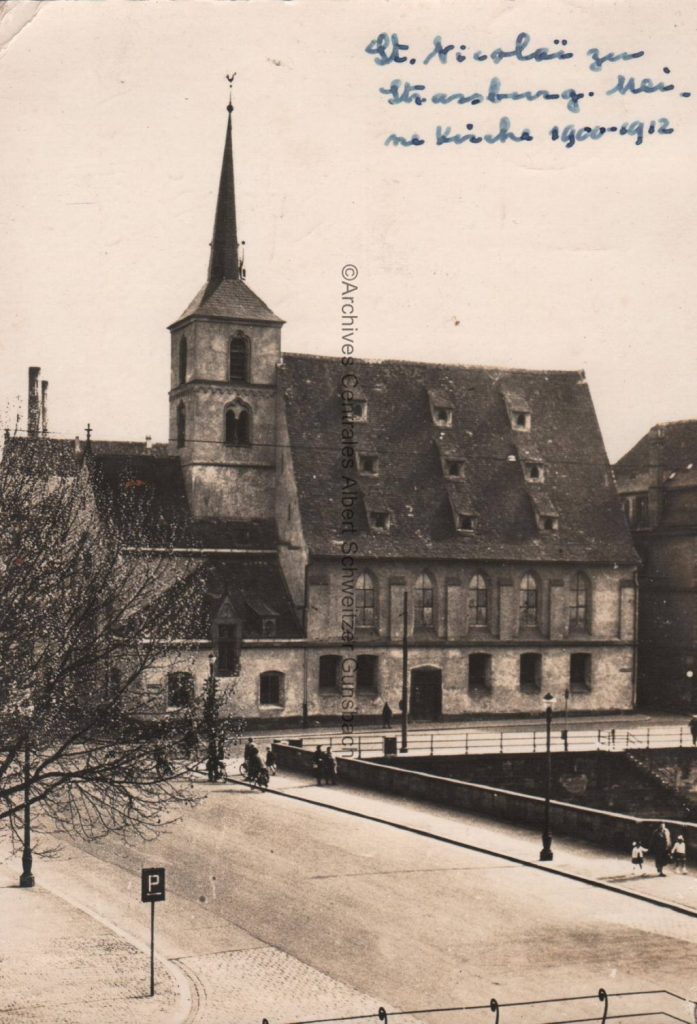
When Schweitzer left the University to devote himself fully to the preparations for his forthcoming departure, he refrained from resigning. In June 1912, shortly before his marriage to Hélène Bresslau, the daughter of a renowned history professor, he applied to the Faculty of Protestant Theology for a two-year leave of absence, thus leaving open the possibility of a return. Judging that his work as a missionary doctor had nothing to do with the duties of an academic, the Faculty rejected his request in December 1912. Instead, she was awarded the honorary title of Professor by the Emperor, in recognition of her “universally gifted talent as an author”, her “remarkable zeal” and “uncommon penetration of mind”. It was only on 4 April 1913, when he was in Dakar, that Professor Schweitzer sent the rector of the University of Strasbourg the letter of resignation that the Faculty of Protestant Theology had requested. The fact that he waited so long to take this step shows how difficult it was for him.
Albert Schweitzer was not selected, however, and this rejection, no doubt linked to his sermons in autumn 1918 (rather than celebrating France’s victory, they urged all mankind to respect the commandment “Thou shalt not kill…“), is not mentioned in his autobiography. The most that can be said is that, in 1919, the ecclesiastical newspaper Kirchenbote, to which he contributed, was highly critical – and rightly so – of the advanced age and lack of qualifications of several new teachers at the Protestant Faculty. Even today,” he wrote in 1931 in “Out of My Life and Thought”, “I cannot look without pain at the windows of the second lecture hall to the east of the main entrance to the University’s main building [the Palais Universitaire], where I used to hold my lectures.“
In 1905, Schweitzer wrote to Hélène Bresslau, his future wife, that he could no longer remain a Privatdozent, a “man who teaches instead of acting”. Did this sound the death knell for reflection, summoned to give way to action? Things are more nuanced.
Schweitzer, the carer and humanitarian, remained a man of reflection throughout his life. Admittedly, the author of The philosophy of civilization (1923) refused to be an ethicist in chambers; from 1913 onwards, he devoted himself to relieving suffering. However, he did not abandon writing and lecturing; even in his later writings on nuclear testing, nourished by scientific and philosophical readings, Albert Schweitzer remained a true academic, keen to learn and pass on his knowledge.
As a theologian, philosopher and doctor, he received honorary doctorates from the most prestigious universities: Zurich, Prague, Edinburgh, Oxford, Cambridge, Chicago and Tübingen, to name but a few. Other universities have offered him a chair, unlike Strasbourg, which has twice neglected to accept him. We hope that the University of Strasbourg will soon mark in stone its gratitude and pride at having had such a talented, fertile and universal mind in its midst for almost twenty years.
Matthieu ARNOLD (Published in Les Saisons d’Alsace, special edition February 2013, p.18-23)